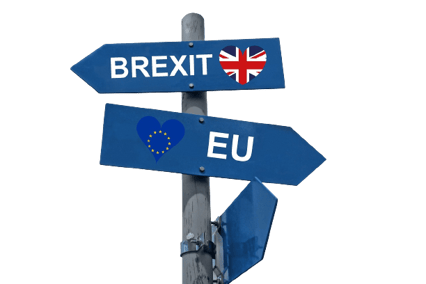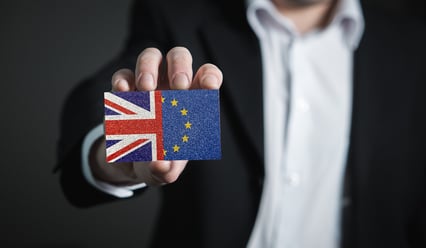How Brexit Impacts Irish Businesses: Consequences and Strategies
After a long negotiation period between the United Kingdom (UK) and the European Union (EU), the UK’s vote to exit the EU officially came into effect at the beginning of 2021. The so-called Brexit defines the new relationship between the UK and EU countries, which affects various aspects of international trade, travel, and work.
Since Ireland remains a member of the European Union, it has suffered from Brexit's consequences on business relationships and the economy. So, what is the impact of Brexit on Irish businesses?
Brexit's Economic Impact on Irish Businesses
Having easy access to the UK market used to be a big part of Irish trade. However, goods are now moved between EU and non-EU countries, which means that new rules apply. Additional paperwork has to be filed, and customs duties are required.
These changes in light of the Northern Ireland Protocol hamper access to the UK market and cause complications affecting the whole supply chain. Issues such as bottlenecks, delays, and subsequent supply shortages transform the relationships between Irish companies and suppliers from the UK. Irish companies might switch to EU partnerships in fear of future tariffs on UK imports, for example.
Regulatory and Legal Considerations
Brexit pushed Irish businesses into a complex landscape of regulatory and legal adjustments, bringing new trade rules, custom procedures, and documentation requirements. Impacting not only trade between Ireland, the UK, and the EU, Brexit also changes product standards, certifications, and trade agreements. Irish businesses need to be compliant with these regulations and meet the criteria in order to penetrate the European market.
Furthermore, as the UK and the EU separate their courses, Irish companies must be aware of distinct regulations regarding intellectual property rights and data protection in the post-Brexit environment.
Financial Implications
The consequences of Brexit can be seen in financial implications as well.
The post-Brexit environment characterizes volatility of currency fluctuation, economic instability, and revised VAT regulations, forcing Irish businesses to adapt their financial strategies when engaging in trade with the UK.
However, apart from the Protocol, Ireland has received EU assistance to help mitigate the financial consequences of Brexit through the Brexit Adjustment Reserve – €5.37 billion in funding to support Brexit's worst-affected Member States, regions and sectors.
Border and Customs Challenges
Special trading arrangements had to be made as a part of Brexit since Northern Ireland is part of the United Kingdom and shares a land border with the EU member Republic of Ireland. These arrangements, known as the Northern Ireland Protocol, are supposed to prevent a hard border between the two mentioned countries.

Before Brexit, transport across the border used to be trouble-free since EU rules applied on both sides, but now complications arise. The European Union requires inspections of certain goods entailing a hard border with checkpoints and inspections, as well as a lot of paperwork. As a consequence of these complications, the supply in Irish supermarkets and grocery stores decreased, and product orders were delayed.
Workforce Considerations
Since Brexit, employment requirements have changed and companies operating in Ireland and the UK work in two different legal systems, presenting very complex problems for HR. Irish companies that employ non-Irish and non-UK personnel in the UK need to apply for work permits, and sponsorship licenses as well as deal with very difficult social security costs. With the current labour shortages, this Brexit consequence is a real challenge for Irish businesses.
Mitigation Strategies for Irish Businesses
Are there opportunities in Brexit's aftermath? Even though Brexit’s aftermath includes a lot of challenges and complications for Ireland, it is always important to see the positive side of things.
Ireland remains the only primarily English-speaking country in the EU, which puts it in a very attractive position for UK-based companies that want to relocate, as well as US companies that want to have better access to the EU market with an English-speaking base. Moreover, the challenges Ireland had to face can be an impulse to seek new economic relationships and market opportunities outside of the United Kingdom.

Nevertheless, dealing with the mentioned issues requires a lot of experience in the European market, and that is where EuroDev comes into play. With EuroDev HR Outsourcing, you can hire abroad fast without worrying about setting up an entity. You will stay compliant in every European country of your choice, and you will have an excellent team experienced to offer the necessary HR support. Let’s chat about the next steps for your hiring in Europe.
Disclaimer: While we strive to provide accurate and timely information, please note that HR policies and regulations can change frequently. It is recommended that you seek guidance from our HR consultants to ensure that the data presented here is current and accurate.
Source: BBC, European Commission
Category
Related articles
-

Notice Period and Severance Pay in EU Countries in 2025
8 April 2025While specific rules vary from one country to another, they are typically shaped by national...
Read more -

Unlimited Vacation: Who Offers It and Does It Really Work?
3 April 2025Discover the benefits and challenges of unlimited vacation policies and how companies successfully...
Read more -

Building a Dream Team: Comprehensive Guide |Part II
24 March 2025It requires careful planning, nurturing relationships, and a deep understanding of the elements...
Read more

